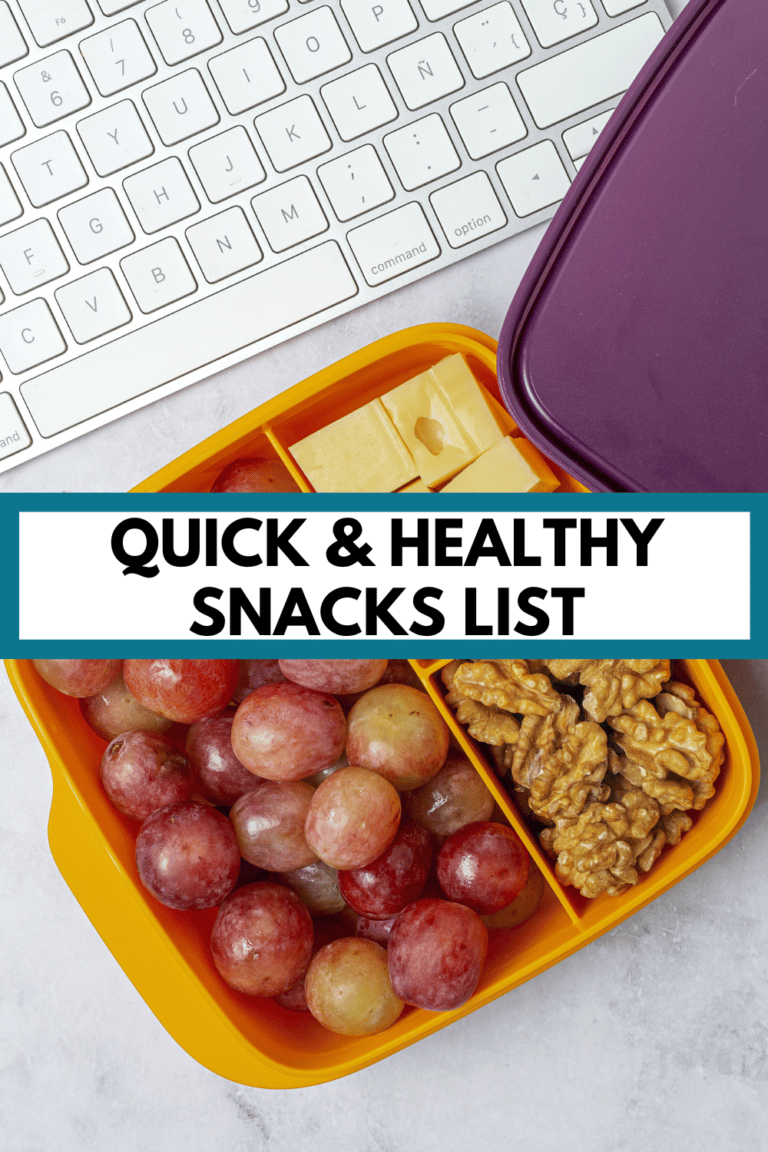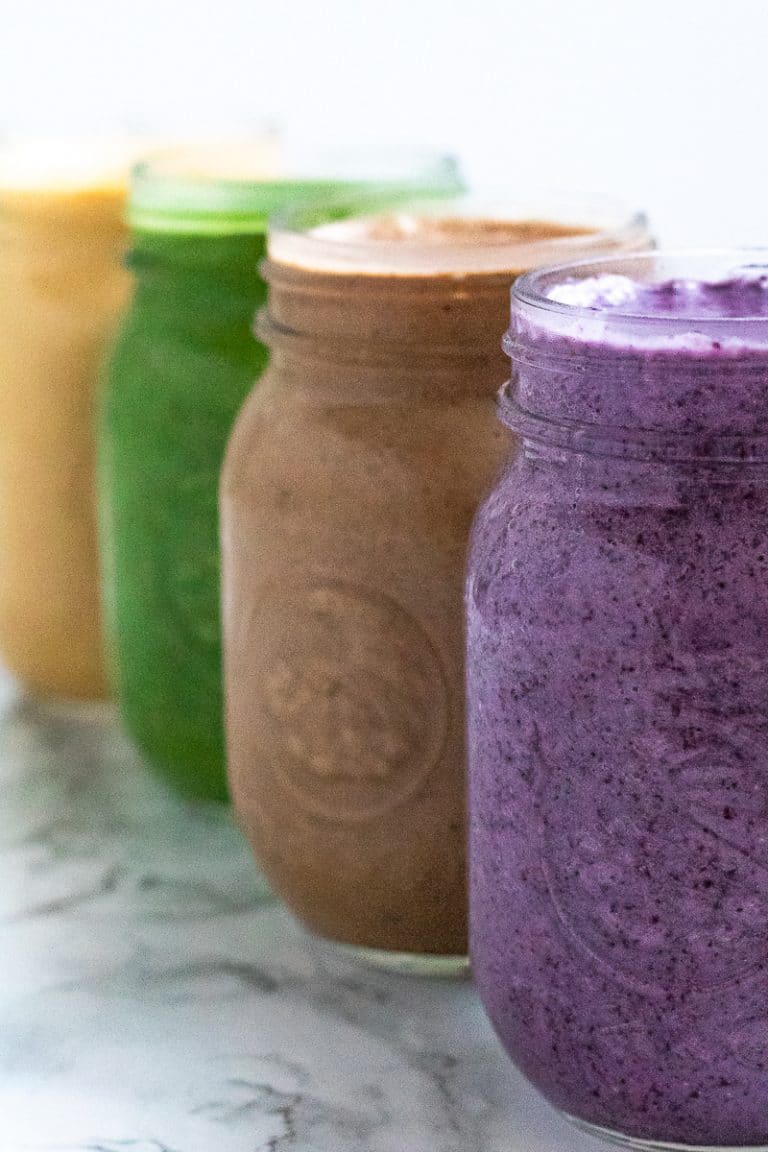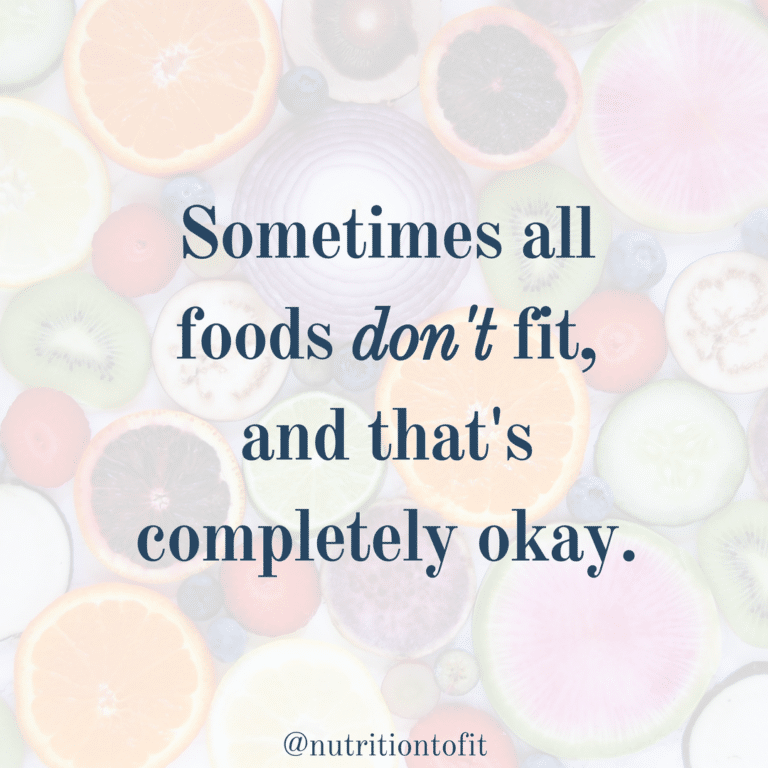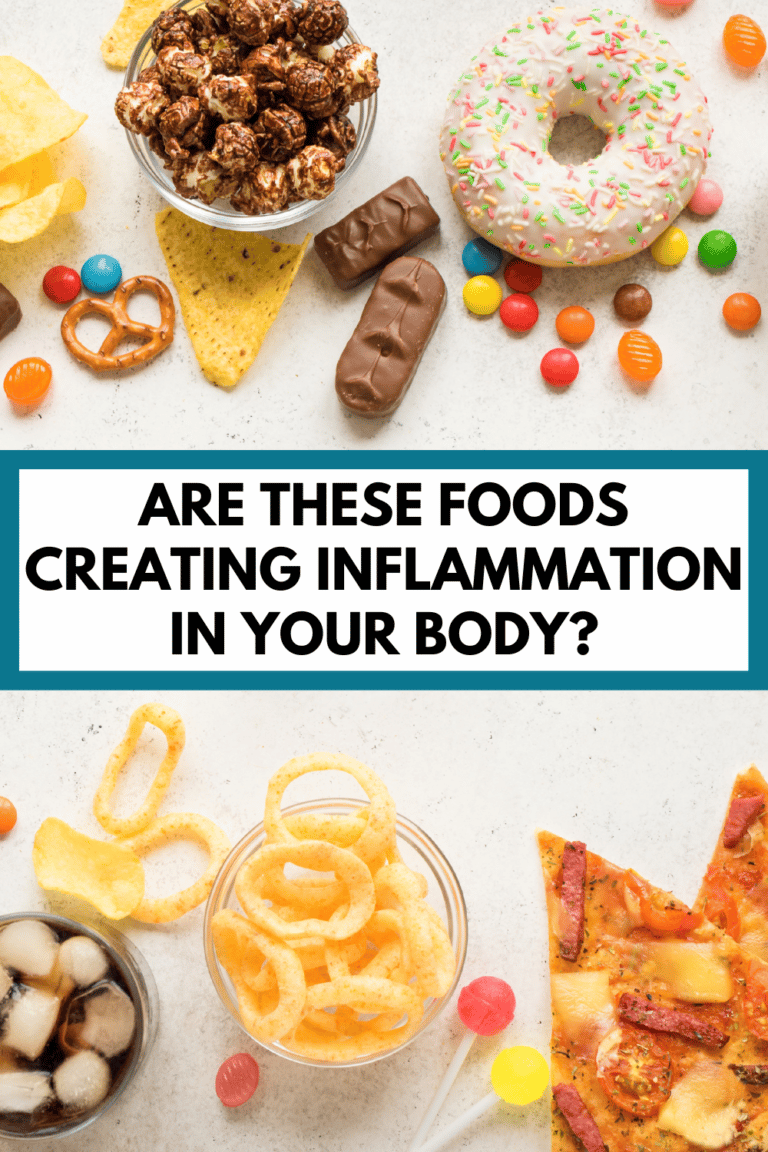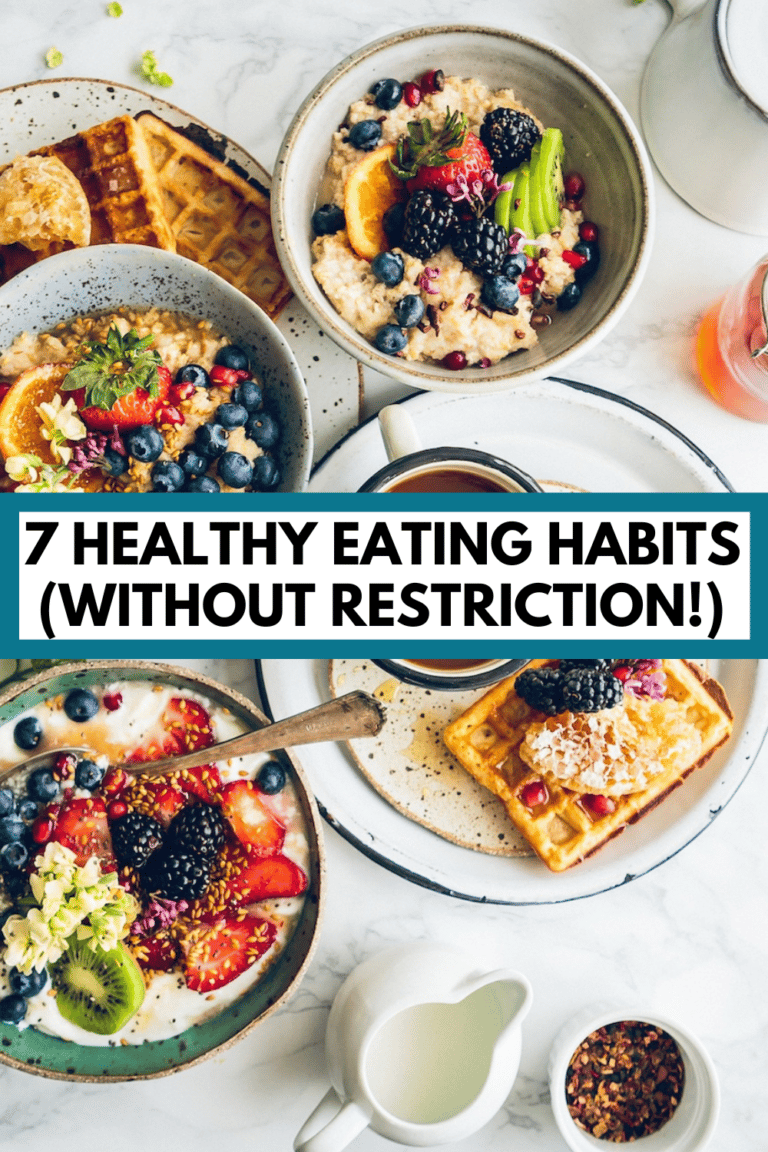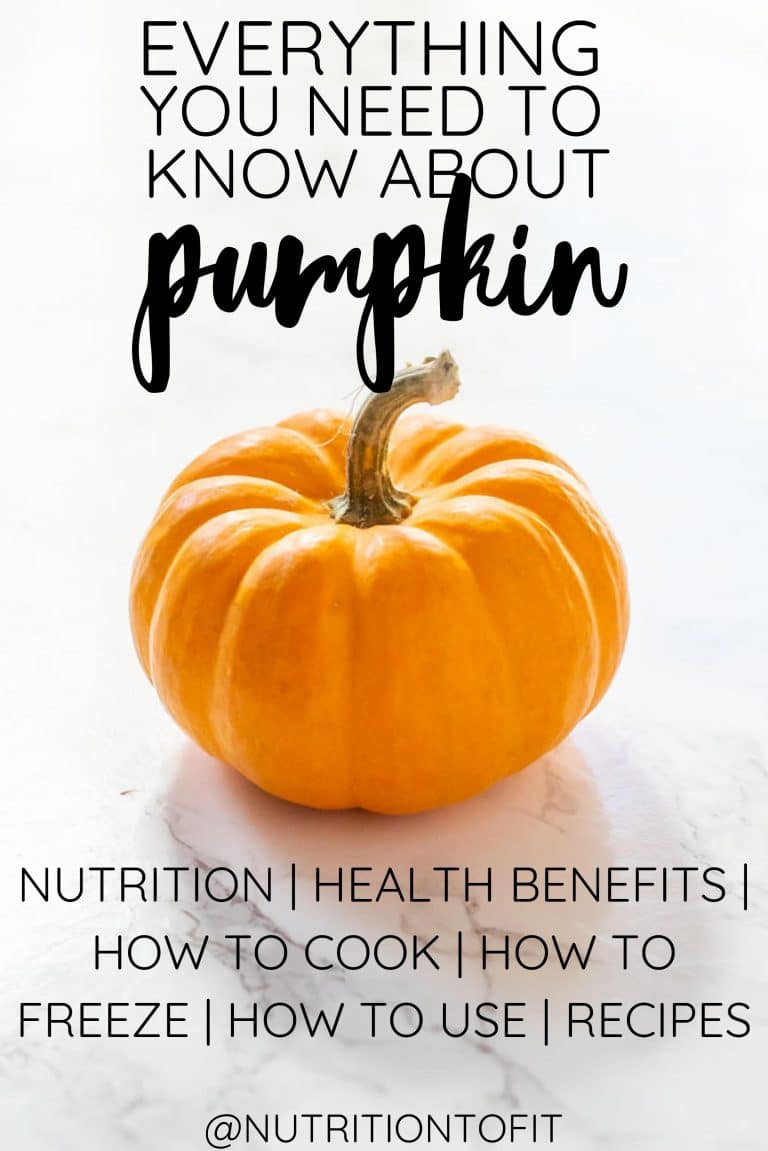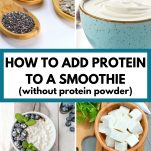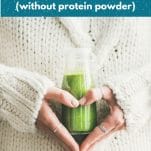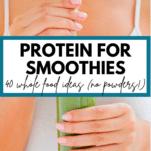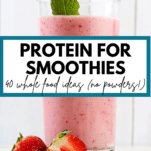Protein for Smoothies: 40 Ways to Add Protein to Smoothies without Powders!
Smoothies can be a wholesome snack or on-the-go meal packed with nutrition…right? Then why do you often feel hungry and your blood sugar crashing an hour after you drank one? If this sounds familiar, it may be time dial in your smoothie game and think about ways to add protein to your smoothies to keep you energized and satisfied! Check out these 40 additions of protein for smoothies – no protein powder needed.
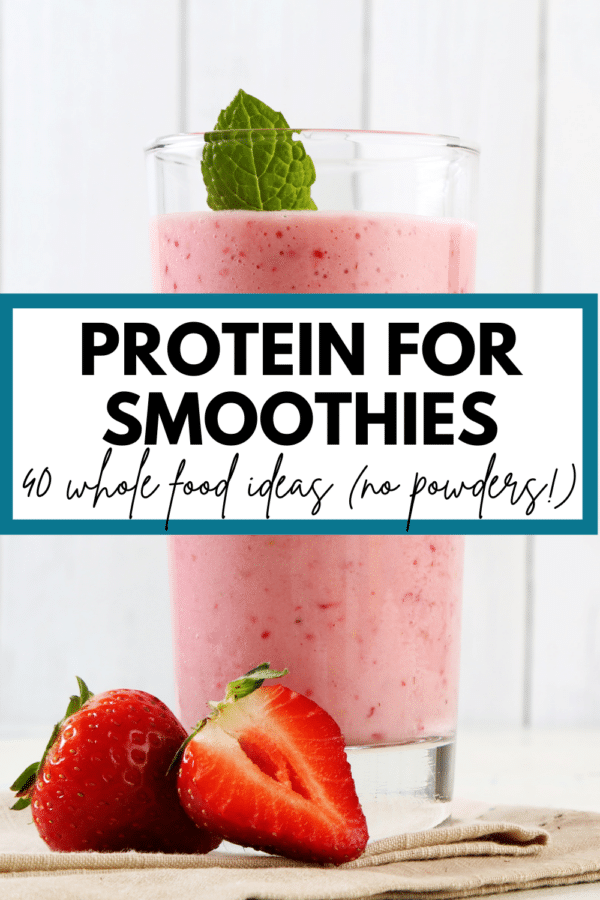
Y’all know I’m a big fan of smoothies. Since 90% of American adults don’t eat the daily recommended amount of fruits and vegetables (per the CDC in 2017), smoothies can be an efficient (and tasty!) way to pack in some more produce. And from the comments and emails I’ve received about my popular NTF 5-a-Day Green Smoothie that helps you get five servings of fruits and vegetables in one glass, I’d say many of you seem to agree!
Protein for Smoothies
But as much as I adore produce (and all the fiber, vitamins, minerals, and so much other nourishment that comes with it!), there’s something else a balanced smoothie needs: protein.
Consuming protein with a meal can help us feel more satisfied. Not to mention the man ways protein shows up in our bodies, like hormones, enzymes, cell and tissue structure, and so, so much more.
From a blood sugar perspective, pairing foods higher in sugar (even those naturally occurring, like in fruit) with protein, fiber, and fat can help create steadier blood sugar.
For more information on the role of protein in our bodies, check out this post I wrote detailing everything you need to know about protein.
What About Protein Powder?
Protein powders and other protein-rich supplements (like collagen peptides) are easy, popular protein for smoothies options. But they’re not for everyone.
Whether you don’t like the taste or texture of protein powder, prefer whole food sources, or just don’t want to buy protein powders – that’s valid! But it’s still important to balance your smoothie with a little protein.
So, I’m sharing a protein for smoothies resource I give to my clients: 40 ways to add protein to smoothies – without protein powder! You’ll see a wide variety of foods, from dairy products to nuts and seeds to even fruit and vegetables.
How the List is Arranged
Before I share the list, I do want to know that the list is arranged by what I and my clients have often felt are acceptable amounts of these food sources to include in a smoothie – i.e. more than a couple tablespoons of nuts is going to add way more calories and healthy fats than protein, and may leave little room for other ingredients.
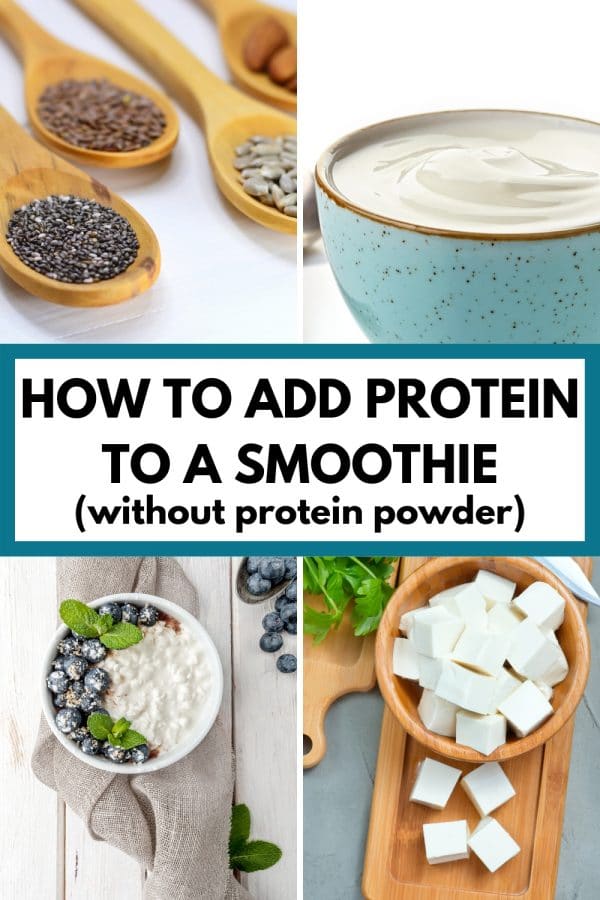
Non-Powder Protein for Smoothies:
- Cottage Cheese (1% milkfat, 1/2 cup, 81 kcal, 14g protein)
- Ricotta Cheese (part-skm, 1/2 cup, 171 kcal, 14g protein)
- Greek Yogurt (1/2 cup plain, nonfat, 67 kcal, 11.6g protein)
- Tofu (1/4 cup firm, 90 kcal, 10.9g protein)
- Regular Yogurt (1/2 cup plain, nonfat, 64 kcal, 6.5g protein)
- Hemp Seeds (2 tbsp, 111 kcal, 6.3g protein)
- Chia Seeds (2 tbsp, 138 kcal, 5g protein)
- Kefir (lowfat, plain, 1/2 cup, 52 kcal, 4.6g protein)
- Edamame (1/4 cup, 47 kcal, 4.5g protein)
- Pumpkin Seeds (2 tbsp, 85 kcal, 4.4g protein)
- Lentils (1/4 cup cooked, 55 kcal, 4.3g protein)
- Milk (1/2 cup skim, 43 kcal, 4.2g protein)
- Peas (1/2 cup, 59 kcal, 4g protein)
- Sunflower Seeds (2 tbsp, 102 kcal, 3.6g protein)
- Peanut Butter (1 tbsp, 96 kcal, 3.6g protein)
- Soy Milk (1/2 cup unsweetened, 40 kcal, 3.5g protein)
- Almond Butter (1 tbsp, 98 kcal, 3.4g protein)
- Cashews (2 tbsp, 105 kcal, 3.4g protein)
- Sesame Seeds (2 tbsp, 103 kcal, 3.2g protein)
- Pistachios (2 tbsp, 86 kcal, 3.1g protein)
- Garbanzo Beans (1/4 cup drained and rinsed, 53 kcal, 2.7g protein)
- Oats (1/4 cup dry, 77 kcal, 2.7g protein)
- Flax Seeds (2 tbsp ground, 75 kcal, 2.5g protein)
- Walnuts (2 tbsp chopped, 96 kcal, 2.2g protein)
- Quinoa (1/4 cup cooked, 56 kcal, 2.0g protein)
- Broccoli (1/2 cup, 15 kcal, 1.5g protein)
- Avocado (1/2 California avocado, 109 kcal, 1.4g protein)
- Banana (1 medium, 105 kcal, 1.3g protein)
- Cauliflower (1/2 cup, 16 kcal, 1.3g protein)
- Cacao Nibs (1 tbsp, 63 kcal, 1.3g protein)
- Sweet Potato (1/4 cup, 62 kcal, 1.1g protein)
- Dried Apricots (1/4 cup, 78 kcal, 1.1 g protein)
- Cocoa Powder (1 tbsp, 12 kcal, 1g protein)
- Spinach (1 cup, 7 kcal, 0.9g protein)
- Turnip Greens (1 cup chopped, 18 kcal, 0.8g protein)
- Spirulina (2 tbsp, 4 kcal, 0.8g protein)
- Cherries (1/2 cup pitted, 49 kcal, 0.8g protein)
- Raspberries (1/2 cup, 32 kcal, 0.7g protein)
- Zucchini (1/2 cup, 11 kcal, 0.7g protein)
- Kale (1 cup, 7 kcal, 0.6g protein)
Real Food Protein Smoothie Recipe Inspiration
I’ll be the first to admit that the majority of these foods don’t have the same protein content as a protein powder. But what’s important to note is how quickly protein can add up if you’re intentional when selecting your smoothie ingredients. See for yourself! Check out some of my favorite high protein smoothie recipes below that all contain over 20 grams of protein:
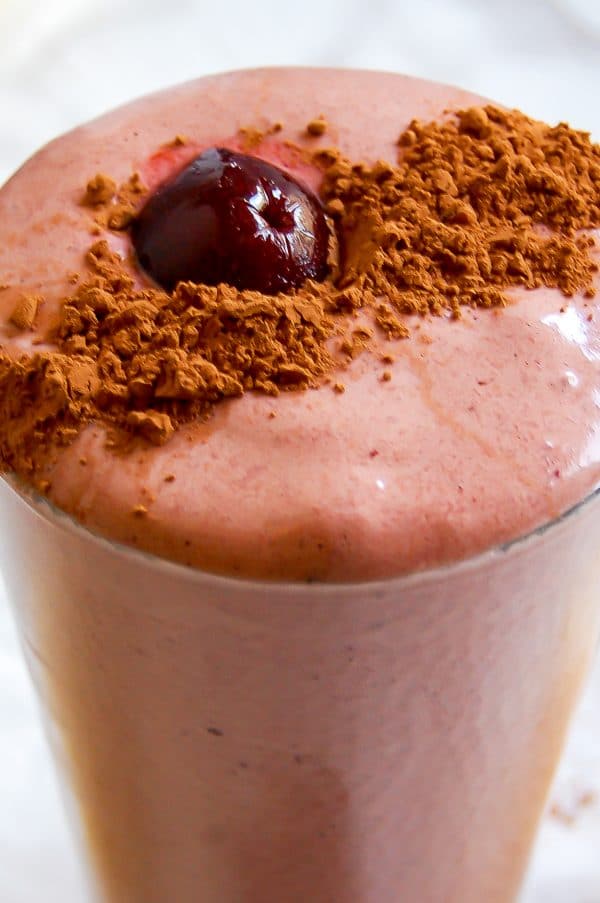
Black Forest Smoothie
- Pitted cherries (1 cup frozen – 1.6 grams protein)
- Fresh spinach (2 cups – 1.8 grams protein)
- Skim milk (1 cup – 8.4 grams protein)
- Cocoa powder (1 tbsp -1 gram protein)
- Plain, nonfat greek yogurt (1/2 cup – 11.6 grams protein)
- Honey (1 tsp – 0 grams protein)
TOTAL PROTEIN: 22.4 grams
Raspberry Parfait Smoothie
- Raspberries (1 cup – 1.4g protein)
- Banana (1/2 – 0.6g protein)
- Cauliflower (1/2 cup – 1.3g protein)
- Plain, nonfat yogurt (1/2 cup – 6.5g protein)
- Skim milk (1/2 cup – 4.2g protein)
- Oats (1/4 cup – 2.7g protein)
- Almond butter (1 tbsp – 3.4g protein)
- Cinnamon (1/4 tsp – 0g protein)
TOTAL PROTEIN: 20.1 grams
Green Giant Smoothie
- Avocado (1/2 – 1.4 g protein)
- Broccoli (1/2 cup – 1.5g protein)
- Spinach (2 cups – 1.8g protein)
- Zucchini (1/2 cup chopped – 0.7g protein)
- Chia seeds (2 tbsp – 5g protein)
- Firm tofu (1/4 cup -10.9g protein)
- Dried apricots (1/4 cup – 1.1g protein)
- Fresh mint (2 sprigs – 0g protein)
TOTAL PROTEIN: 22.4 grams
Sweet Potato Pie Smoothie
- Sweet potato (1/2 cup mashed – 2.2g protein)
- Cottage cheese (1/2 cup fat free – 14g protein)
- Medjool dates (2 – 0.9g protein)
- Skim milk (1/2 cup -4.2g protein)
- Hemp hearts (2 tbsp – 6.3g protein)
- Oats (1/4 cup – 2.7 g protein)
- Pumpkin pie spice (1/2 tsp – 0g protein)
TOTAL PROTEIN: 30.3 grams
Peanut Butter Cup Smoothie
- Ricotta cheese (1/2 cup part-skim – 14 g protein)
- Skim milk (1/2 cup – 4.2g protein)
- Cocoa powder (2 tbsp – 2g protein)
- Peanut butter (1 tbsp -3.6g protein)
- Spinach (1 cup – 0.9g protein)
- Zucchini (1 cup chopped -1.4g protein)
- Honey (1 tsp – 0g protein)
TOTAL PROTEIN: 26.1 grams
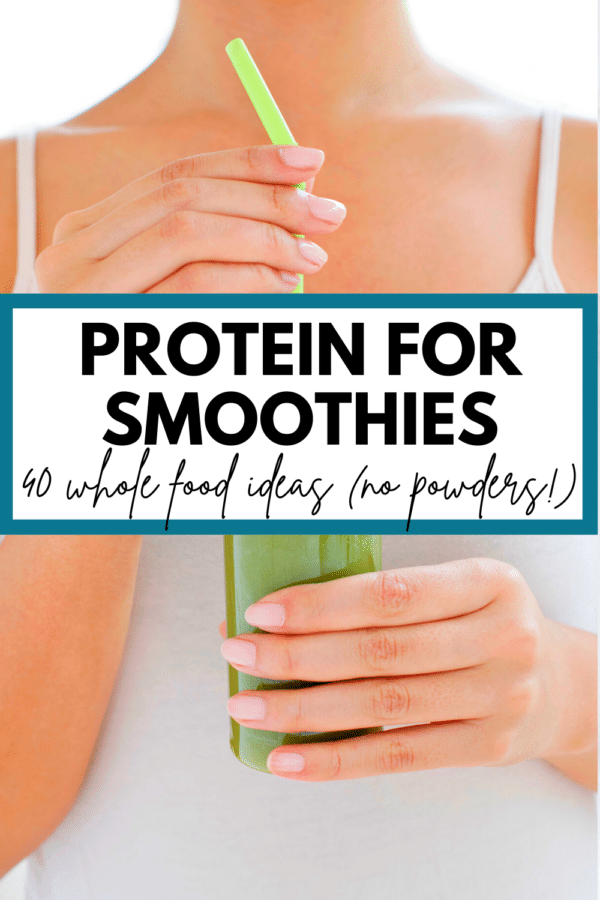
You can also check out these NTF smoothie recipes with real food protein sources in other posts:
- Wild Blueberry Lemon Ricotta Smoothie
- Peach Banana Smoothie
- Chocolate Veggie Smoothie
- Creamsicle Clementine Smoothie
- Strawberry Banana Blackberry Smoothie
Share your favorite smoothies with real food protein ingredients in the comments! And if you found this post valuable, please save it to Pinterest and share with your community on Facebook and Instagram. Thank you, and live well!
Enjoy this post? Check out this related on post of 21 Ways to Add Protein to Salads!
All nutrition information gathered from the USDA FoodData Central nutrient database.

